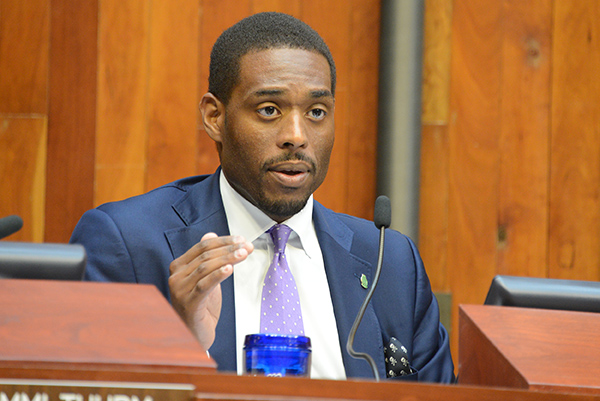Mayoral candidate and City Councilmember Justin Outling is a partner in the Brooks Pierce law firm, which is one of the largest in the area, with over 100 attorneys.
Because he is a partner in the firm and therefore has a financial interest in all the firm’s business, he has to frequently ask to be recused from votes because of a conflict of interest.
At many meetings this means that Outling has to be recused from a couple of “consent agenda” items. The consent agenda are a number of noncontroversial, routine and housekeeping type items that are grouped together and passed with one vote. Whether the consent agenda passes with an 8-0-1 vote or a 9-0 vote isn’t a big deal. However, at the March 15 City Council meeting, Outling asked to be recused from items 17 through 38 on the consent agenda, and then three items on the general business agenda.
All of the items had to do with the Greensboro-Randolph Megasite and the City of Greensboro providing water and sewer service to the Toyota Battery Manufacturing, North Carolina plant at the site. Toyota plans to spend $1.29 billion on building the battery manufacturing facility creating over 1,750 new jobs and it is an extremely big deal.
The recusal of Outling from the 21 consent agenda items at the March 15 meeting led to some confusion on how to proceed. Mayor Nancy Vaughan said she had been told that she would have to read each item and the City Council would have vote on each item separately. Because the City Council meetings are considered “hybrid” meetings, where councilmembers and the public can participate remotely, votes have to be confirmed by voice votes, which is a tedious process.
Fortunately, after the first couple of items, Councilmember Tammi Thurm asked why they were voting on consent agenda items separately and City Attorney Chuck Watts was consulted. Watts said there was no need to vote on the items separately and like other consent agenda items they could all be approved with one vote, which allowed the meeting to move much more quickly.


With all the crooked, barely legal stuff this Council does, don’t fault Outling for being honest. Vote the rest of the bums out in May.
Mandate Mayor has been in council meetings for a decade or more and is completely clueless as to standard format and rules. Why are we funding these elected officials that ignore parliamentary procedures and try to just rule by fiat. Probably ignorance of their positions and how government actually works is more apt.
District 3 has constantly been shortchanged in their representation by Outling’s constant recusals. Why would anyone want that to continue if he were elected mayor? Then the entire city is shortchanged and it gives more weight to off-beat thinking and voting such as Sharon Hightower brings to the table.
I am dazed and confused. There is no remedy, except perhaps a tropic isle with no junque to ruin it. I’m thinking Huahine.
Adios and bon voyage. I’ll help you pack.
There’s lots of us that will help you pack and we will gladly pay for a one way ticket
Offer accepted!
I knew that was coming. Parahi.